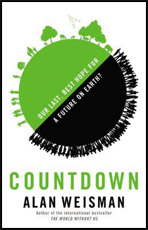According to Alan Weisman, an award-winning journalist whose reports have appeared in Harper's, The New York Times Magazine, The Atlantic, Vanity Fair, Mother Jones, Discover, and on NPR, there are now seven billion people on earth and another million more join us every four-and-a-half days on a planet not getting any bigger. In addition, there are nearly 500 cities with a million people, maybe more, "all eliminating wastes, emitting carbon dioxide, all requiring food, fuel, living space, multiple services — and for those who've recently moved to town from the hinterlands: considerably more electricity, to charge their mobile phones and plug in their inevitable TVs."
In this startling wake-up call, Weisman reports his findings in 21 countries where he asked religious leaders, scientists, public health workers, demographers, and others questions designed to have them think about the number of people the planet can hold with enough fresh air, water, and food for everybody. What ethical or moral precepts would they use to convince their neighbors that it is in their own best interest to consider these issues? And how can we explain to the thousands of newly rich individuals in China and India that they must cut back and rework an economy based on swift growth?
Weisman is worried about the formidable size of these problems of overpopulation, excessive consumerism, and economies built on growth. What's involved in getting families to limit the number of children they have and for nations to take on the challenges of global warming? The most interesting chapter is the one on China but there are also thought-provoking reports from Israel, Pakistan, Uganda, and Niger. One of the keys to the future lies in a saying by Paul Ehrlich who has written widely on population ecology: "Two will do." If families around the world followed this recipe of two children, we could halt population increase before it becomes catastrophic. But who is going to set the example for our people-packed planet?
